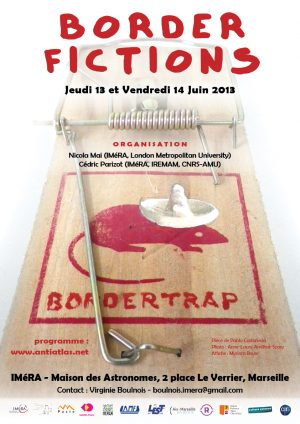IMéRA, Marseille – 13 et 14 juin 2013

Quelle est la relation entre la matérialité et la représentation des frontières? Est-ce que les technologies contemporaines ont fondamentalement modifié cette relation? Est-ce que les cartes représentent ou engendrent des territoires ? Ce séminaire évaluera l’impact des changements technologiques contemporains sur la relation entre la représentation et l’expérience des frontières ainsi que sur les formes de conscience associées. Il mettra en œuvre une perspective transdisciplinaire en réunissant des chercheurs en sciences humaines (historiens, sociologues, anthropologues, géographes, philosophes, politologues), en sciences dures (intelligence artificielle, informatique) et des artistes (webart, hypermédia, arts plastiques).
/
plus d’infos / more informations : www.antiatlas.net/border-fictionsfictions-et-frontieres
/
What is the relationship between the materiality and representation of borders? Has contemporary technology fundamentally altered this relationship? Do maps mirror or engender territories? This seminar will explore whether contemporary technological shifts impacted on the relationship between the representation and experience of borders and on the associated forms of consciousness. It will implement a trans-disciplinary perspective by bringing together human scientists (historians, sociologists, anthropologists, geographers, philosophers, political scientists), hard scientists (artificial intelligence, computer sciences) and artists (webart, hypermedia).
PROGRAM
14h-16h Atelier 1/Workshop 1 : Border Fictions/Fictions de Frontières
Président/Chair : Jean Cristofol, (Philosophie, École Supérieure d’Art d’Aix)
– Bernard Guelton (Arts, Paris, UMR ACTE, CNRS, Université Paris 1)
Fiction de Frontières : Dispositifs Fictionnels et Virtuels/ Border Fictions: Virtual and Fictional Mechanisms/
– Michelle Stewart (Film Studies, Résidente IméRa, State University of New York)
Borders became sites of security with the modern state’s consolidation of its monopoly on violence within mapped territories. As such, the experience of the border and passage across has been a problem, both theoretical and material, for some time. Yet now, with the increasing porousness of borders for the ever more rapid transfer of capital, we find that the physical experience and political discourse of the border have hardened exponentially. Technological advances have permitted greater securitization and surveillance regimes for these sites of passage. In recent cinema, a number of filmmakers have crafted parallel aesthetics in an attempt to visualize the phenomenological toll and the political consequences of this border regime. Via close analysis and comparison of these works that traverse the borders of North America, Europe, and Africa, we see how border fictions intervene in the politics of fortification and exclusion.
– Nicola Mai, (Résident IMéRA, London Metropolitan University)
Re-assembling Samira: antiAtlas work in progress installation/Le Ré-assemblage de Samira : présentation du ‘travail en cours’ pour l’exposition antiAtlas
9h30-11h00 Atelier 2/Workshop 2 : Re-Bordering Representations /Representations Frontièrisantes
Président/Chair: Anne Laure Amilhat Szary (Géographe, Laboratoire PACTE, Université de Grenoble)
– Jean Cristofol, (Philosophe, École Supérieure d’Art d’Aix en Provence)
‘Distance and Proximity in a Multidimensional Space/Distance et Proximité dans un Espace Multidimensionnel’
– Larisa Dryansky (Histoire de l’Art, Université Paris-Sorbonne, Paris IV)
‘Border and Utopia in the Work of Dennis Oppenheim/Frontière et Utopie chez Dennis Oppenheim’
– Philippe Rekacewicz, (Journaliste et Cartographe, Le Monde Diplomatique ; MIT Program for Art, Culture and Technology)
Cartographie entre Art, Science et Politique/ Cartography between Art, Science and Politics
14h30-16h00 Atelier 3/Workshop 3 : Art-Science Counter-fictions/Contre-Fictions Art-Science
Président/Chair: Nicola Mai (Anthropology, Résident IMéRA, London Metropolitan University)
– Susan Ossman, (Anthropology, University of California Riverside)
‘The Arts of the Border: A Transnational Creative Conversation/L’Art de Frontières : une Conversation Créative Transnationale.
– David Napier, (Social Anthropology, University College London)
‘Undoing the Dichotomy of Self and Other across Immunology, Anthropology and Art/Problematiser la Dicotomie entre Soi et Autre à travers l’Immunologie, l’Anthropologie et l’Art’.
– Maggie O’Neill ‘(Critical and Cultural Criminology, University of Durham)
‘Transgressive Imaginations: Border Spaces, Ethnography and Performance Art/Les Imaginations Transgressives : Espaces Frontière, Ethnographie et Performance Art’

Leave a Reply
You must be logged in to post a comment.